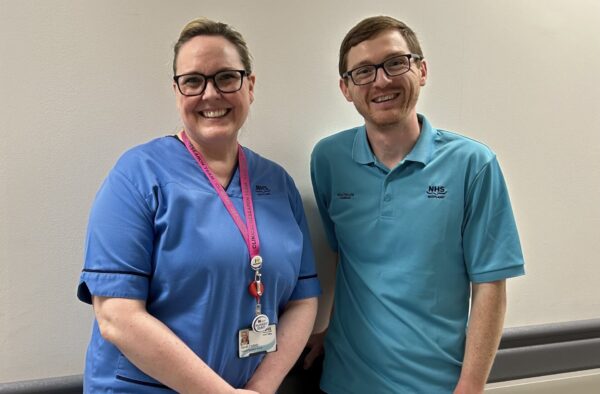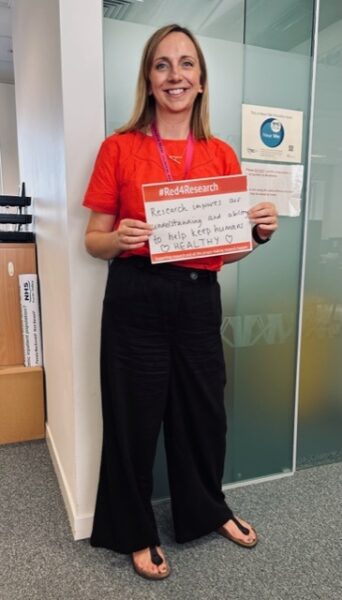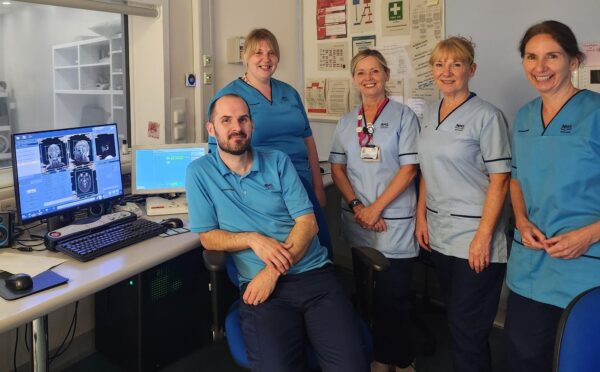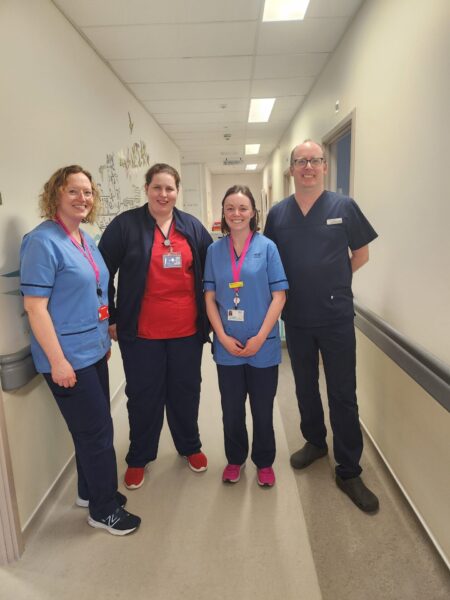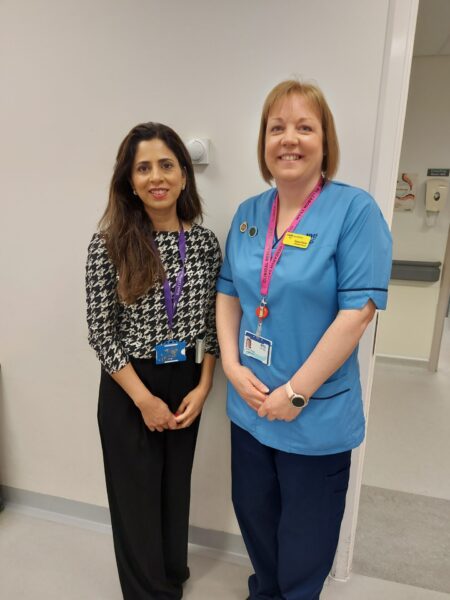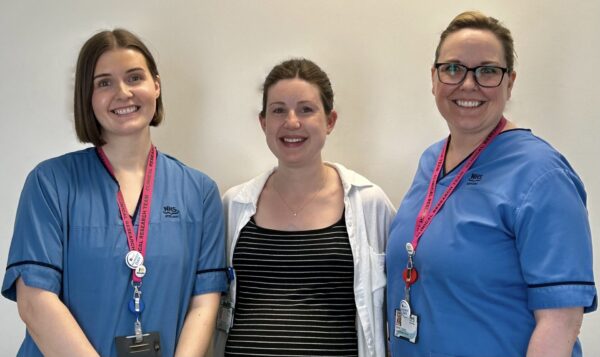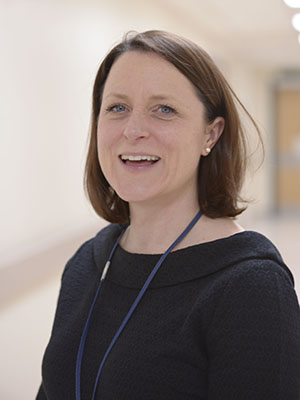Explore how NHS Forth Valley’s R&D team is driving innovation through leading research.
This study is investigating what is the best time for people with severe asymptomatic aortic stenosis to have valve replacement surgery. The current standard of care is to monitor and wait for symptoms to develop before having surgery. The EASY-AS trial is comparing this method to having valve replacement surgery earlier, before symptoms develop, with the aim of showing whether early surgery improves outcomes while reducing hospitalisations from heart failure due to aortic stenosis.
Sponsor
University of Leicester
Funded by
British Heart Foundation
Key Staff
Principal Investigator – Dr Chris Gingles
Research Nurse – Sarah Fortney
Successes
Forth Valley is on the list of Top Recruiters for 2025 as well as a top recruiter overall, as part of this international, multicentre study. Huge thanks to all staff in the Cardiology Department for their support and the many patients who volunteer their time and experience to participate in this important research.
Contact the Research Team: 01324 567670 or email fv.ClinicalResearchTeam@nhs.scot
Diabetes can cause damage to the small blood vessels at the back of the eye, a condition called diabetic retinopathy. Diabetic retinopathy is one of the leading causes of blindness in adults of working age, and it is one of the top five causes of visual loss worldwide (and the only major cause to increase in recent decades).
Fenofibrate is a tablet that has been used to lower cholesterol for more than 30 years. Previous results from sub-studies of trials looking into treatments for heart disease had suggested that fenofibrate might be able to slow the progression of diabetic retinopathy but more conclusive results were needed, and so the LENS trial was born.
Key point of study
Coordinated by Oxford Population Health, the LENS (Lowering Events in Non-proliferative retinopathy in Scotland) trial compared the effects of fenofibrate with a placebo (dummy tablet) on the progression of retinopathy in 1,151 adults with type 1 or type 2 diabetes in Scotland. In Forth Valley, 113 participated were recruited 1with 91 completing the entire study.
Sponsor
University of Oxford
Research Staff
Principal Investigators: Dr Anna White and Dr John Doig,
Research Team: Margie Duncan, Lynn Ryan, Diabetic Nursing Team, Angela Gilmour, Elaine Wilson
Successes
The LENS trial has demonstrated that fenofibrate, a drug usually used to lower cholesterol, reduces the risk of progression of diabetic retinopathy by 27%.
Further information can be found on the trial website.
This study aims to distinguish normal versus abnormal head MRI scans using machine learning techniques (AI).This will be used to develop a computer program that will help identify abnormalities on MRI scans of the brain and assist in assessment and treatment of patients with brain injury or disease.
Primary Investigator
Dr Nik Arestis
Research Staff
Laura McGenily and Angela Gilmour
Successes
Not only did NHS Forth Valley reach its recruitment target goal of 200 patients but it was also done a month ahead of schedule. This success could not have been achieved without the close collaboration and cooperation of the entire Radiology Department. Special thanks to all the trial participants for their contribution to this important research.
For more information see the study website.
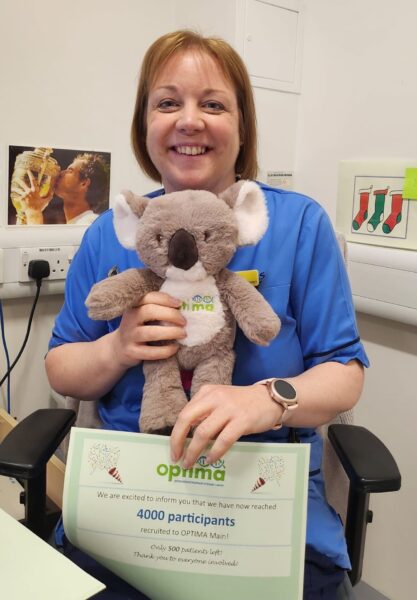 The aim of the OPTIMA study is to improve the way decisions around the use of chemotherapy for patients with breast cancer. Patients with hormone sensitive early breast cancer normally undergo surgery followed by chemotherapy. Following determination of individual risk factors through multi-parameter analysis, OPTIMA randomised patients either receive chemotherapy or do not. Reducing the use of chemotherapy is beneficial to patients and can save time and resources.
The aim of the OPTIMA study is to improve the way decisions around the use of chemotherapy for patients with breast cancer. Patients with hormone sensitive early breast cancer normally undergo surgery followed by chemotherapy. Following determination of individual risk factors through multi-parameter analysis, OPTIMA randomised patients either receive chemotherapy or do not. Reducing the use of chemotherapy is beneficial to patients and can save time and resources.
Sponsor
Funded by National Institute for Health Research (NIHR)
Key Staff
Principal Investigators: Judith Fraser and Rosie Stevens
Breast and Oncology teams
Successes
The trial opened in Forth Valley in 2013 with a target of recruiting 15 patients however by the time it closed in January 2025 at total of 62 patients had been recruited. Local participants will continue to be followed up until 10 years after their surgery.
The results from OPTIMA-Prelim acknowledged of “the group of pioneering women who participated in this study.”
For further information on the results visit the study website and for more information on OPTIMA and other breast cancer clinical trials visit the Cancer Research UK website.
RADAR Myeloma aims to evaluate precision medicine approaches to allocate treatment to patients based on the genetics of their myeloma (standard or high risk) and the patient’s response to initial treatment (MRD – Minimal Residual Disease). Newly diagnosed multiple myeloma patients who are suitable for a stem cell transplant follow a novel trial treatment pathway tailored to their individual disease.
Sponsor
Funded by Cancer Research UK
Research Staff
Principal Investigator: Robbie McNeil
Research Nurses: Anna Hamilton and Laura McGenily
Successes
Staff successfully over-recruited to the study, ahead of target and, although recruitment to the trial is now closed in Forth Valley, local participants continue to receive trial treatment and follow up care.
For more information on RADAR and other Myeloma clinical trials visit the UK Myeloma Society website.
Due to the increased risk of hepatocellular carcinoma (HCC), patients with liver cirrhosis usually have ultrasound scans and blood tests bi-annually. The study aims to identify novel blood biomarkers and to use new imaging techniques to detect HCC at the earliest time point so that effective treatment can be given at an early stage.
The SELINA study aims to recruit patients with small early liver cancers to:
- Evaluate imaging and state-of-the art molecular biomarker tests to detect liver cancer at the earliest stages
- Characterise the non-cancerous “background” liver to better understand the changes that may lead to cancer transformation
- Assess if biomarkers can be used to predict disease progression by clinical follow-up
The SELINA study aims to recruit 200 HCC patients with and 50 without cirrhosis. Blood, urine and liver tissue samples will be collected for analysis.
Sponsor: University of Oxford & CRUK
Research Staff
Principal Investigator: Dr Asma Ahmed
Research Team: Karen Petrie, Anna Hamilton, Angela Gilmour
Upper GI CNS’s: Helen Upfold and Breeda Proctor
Successes
Referrals from local multidisciplinary teams and clinics have been a huge help in finding and recruiting as many eligible patients as possible.
Contact the Clinical Research Team for more information: 01324 566316 or fv.clinicalresearchteam@nhs.scot
This study aims to understand the experiences of women undergoing epidural or spinal anaesthetic for lower segment caesarean section delivery. Specifically, the trial aims understand levels of intraoperative pain, dissatisfaction and distress.
Patients who consented to participate in the study were approached to complete two questionnaires. The first questionnaire was administered within 24 hours of surgery to capture women’s experiences of the procedure and their short-term recovery. The second questionnaire was six weeks later to ask about symptoms of postnatal depression and post-traumatic stress.
The study findings will be used to evaluate the problem of intra-operative pain and inadequate anaesthesia during caesarean section and guide future treatment and research.
Sponsors
University College London NHS Foundation Trust
NIHR Central London Patient Safety Research Collaboration
Research Staff
Principal Investigator – Dr Stuart Hanna
Anaesthetist Team – Dr Charlotte Lucey, Dr Iona Lennie, Dr Morven Millar & Dr Rachel Boyle,
Research Nurses – Elaine Wilson, Erin McCann and Sarah Fortney
Successes
Recruitment for this trial was limited to a small, 7-day period in May 2024. Through close collaboration between anaesthetic, research and midwifery teams, 11 participants were recruited during a very specific and critical time period.
Thanks are due to all the women who consented to take part in the trial during a physically and emotionally life-changing time in their lives. Their contributions will help provide better care for women and their families in the future.
To demonstrate that a de-escalation strategy of ctDNA guided adjuvant chemotherapy is non-inferior to standard of care treatment as measured by a three-year disease-free survival in patients with high-risk stage II or stage III colorectal cancer (CRC) with no evidence of minimal residual disease (ctDNA negative).
Sponsor
The Royal Marsden NHS Foundation Trust
Research Staff
Principal Investigator: Dr Lisa Rodgers
Co-Investigator: Dr Tareq Abdullah.
Clinical Research Team: Karen Petrie, Anna Hamilton, Laura McGenily and Angela Gilmour
Colorectal Team: Nurse Consultant Linnet McGeever, and Colorectal Clinical Nurse Specialists Lindsay Straiton and Lynsey Sewell.
Successes
The trial shows how ctDNA testing can safely de-escalate chemotherapy use and save resources. The research team is meeting monthly recruitment targets and is continuing to offer the trial to more patients.
Contact the Clinical Research Team at 01324 566316 or email fv.ClinicalResearchTeam@nhs.scot


